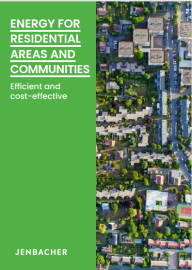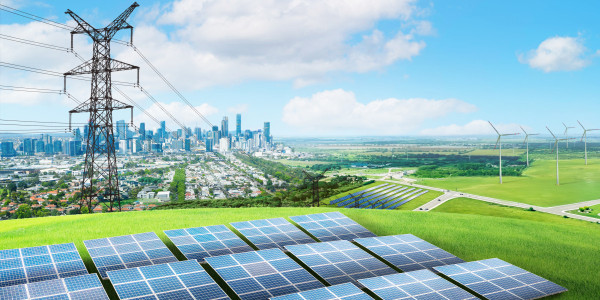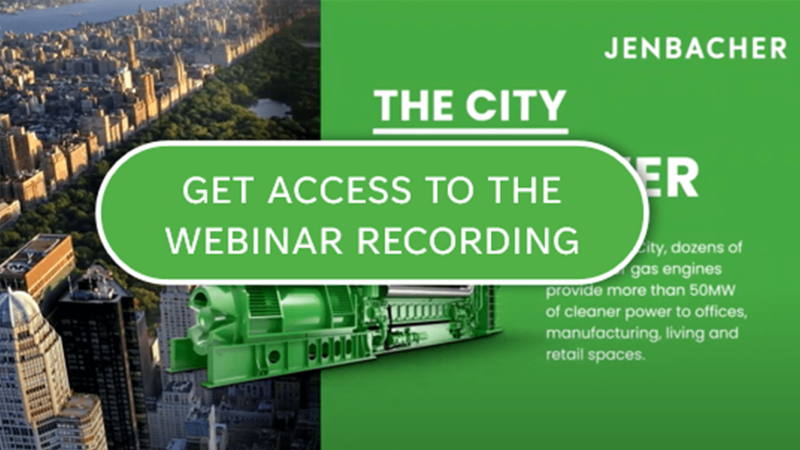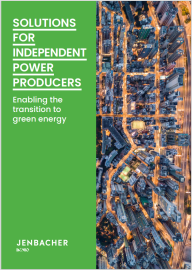IPPs, Utilities and Peaking Power
Efficient, reliable power is fundamental to growth.
Whether your company is a state-owned or a private independent power plant, working in base load, mid-merit, or peak-shaving modes, ecological questions and economics usually play a key role in your business. Jenbacher has a lot to offer to power generating companies.
For more than 50 years (since 1967), we have been producing cogeneration power plants, specializing in gaseous fuels. Jenbacher stands for high power density, reliability, and advanced technologies aiming to increase the efficiency and improve the economics of our customers' projects.
So far, more than 22,000 Jenbacher engines have been installed worldwide with a total capacity of more than 32 GW. In North America, at the moment, more than 850 engines are installed with a total electrical power of more than 1.4 GW.
The engines are available in a range from 300 kW to 10.4 MW. Jenbacher engines have proven themselves in large natural gas power plants of various sizes, such as 10 MW, 50 MW and up to 200 MW. Mainly engines from the 6 and 9 series are used in such power plants. The largest cogeneration power plant using Jenbacher engines, with a size of 200 MW, is in Germany, in the city of Kiel.
Why Power Generating Companies choose Jenbacher:
High Efficiency. Jenbacher* gas engines are designed to be highly efficient, with the maximum electrical efficiency reaching well over 45%. Moreover, Jenbacher equipment works in cogeneration solutions, converting the primary energy of the gas fuel to heat and power, maximizing economical effect for your combined heat and power plant. In cogeneration mode, overall efficiency can reach more than 90%.
Maneuverability. Gas engines ramp up quickly, reaching 100% power output in just a few minutes. Jenbacher operates reliably in partial load modes without significant loss in efficiency. This is especially important in case of fluctuating load curves of the power plant's clients. Typically, gas engines power plant consists not of a single power generating unit, but rather of several gas engines of a certain power. As a result, it is possible to select engines combination, when during partial loads, some of the engines won’t be working, but the rest of the fleet will be working at full power and efficiency. This approach, in the end, increases the efficiency of gaseous fuel consumption, and decreases operational costs, that are usually connected to number of operating hours.
Low emissions level. Nowadays, ecology is in the agenda of almost every enterprise in the US and Canada, and of course this is a very important topic for power plants. Jenbacher reciprocating gas engines operate with NOX parameters of 250 and 500 mg. Moreover, power plants can be equipped with catalytic neutralization systems, which significantly reduce CO emissions. We’ve seen more and more leading economies planning to switch to hydrogen fuel for power generation. Jenbachers can operate on a gas-hydrogen mixture and pure hydrogen. By purchasing a Jenbacher engine today, you can run on natural gas and switch to hydrogen fuel later.
Tolerance to ambient parameters. Gas gensets work regardless of whether the wind is blowing or the sun is shining. Gas engines have a high tolerance to changing parameters of the temperature and humidity, typically providing full output up to 86°F and more. In addition to that Jenbacher engines can operate at high altitudes.
Modularity, short Production and Commissioning time. Jenbacher gas engines are manufactured using modular technology, which greatly simplifies logistics and reduces the time to operation. Our engines can be supplied for installation inside the buildings or as ready-to-use containerized power solutions.
Tolerance to frequent starts/stops. This is especially important for peak power plants. Make sure to check the maximum possible start / stops within the equipment's lifecycle, which is stipulated by some equipment manufacturers. Jenbacher engines are tolerant of frequent starts/stops. Our experts will be able to assess how the planned starts/stops frequency will affect your Jenbacher engines.
Flexible applications
Gas engines work well in combination with other technologies such as renewables (solar panels, wind turbines, fuel cells, etc.). Alternatively, reciprocating engines can be put into operation when renewables, for some reason, cannot provide the required power, or to support the grid during peak loads.
By co-generating electricity and heat, Jenbacher gas engines can be effectively integrated with the existing thermal infrastructure of a natural gas power plant or boiler house.
Gas engines work perfectly both in island mode, in parallel with the grid, and supplying electricity to the external grid. Jenbacher combined heat and power plant can be equipped with master synchronization systems to synchronize gensets with each other and with the external grid. In addition, the power plant can be equipped with a master control systems, which provides intelligent control of the station, automatic demand and power regulation, and other useful functionalities.
Energy is income. Lower downtime equals higher income!
It is clear, that for generating companies, every extra hour of equipment downtime can be a direct cause of profit loss. Therefore, we help our customers to service the equipment throughout the entire life cycle. In North America, service is provided by local team of service engineers who are ready to help customers as soon as possible.
Our engineers are constantly looking into the possibility of increasing the time between standard service events, so engines can operate uninterrupted for as long as possible. This also helps to improve the availability of our engines.
We offer long-term service agreements to our clients, which allow customers to predict, in detail, the cost of services for the entire engine’s lifecycle. Special programs for overhaul and engine replacement can significantly reduce downtime.
Moreover, if your power plant consists of several engines, they can be stopped for servicing in a certain sequence, avoiding complete shutdowns and reducing negative effects on your business. It is no secret that the use of a larger number of engines also improves the reliability of your power generating facility.
Power plant in your pocket
Jenbacher myPlant Performance Management's digital solutions allow you to monitor the status of your power plant. Service data collected from the engines is analyzed by Jenbacher service competence centers, which leads to better engine maintenance, allows solutions to many problems remotely, and as a result, increases the uptime of your power plant. Thanks to myPlant, you take control of the operating performance and profitability of your gas engine power plant.
Benefits

- Up to 48% electrical efficiency yield and as high as 90% for CHP systems
- Ready-to-use, containerized solutions
- Application flexibility: power generation, cogeneration (CHP), municipal applications, grid support in combination with renewables and many more
- Yield high efficiency and reliability with proven technologies
- Benefit from decades of onsite operational experience
- Simplified maintenance with innovative modular design
- Minimize footprint with compact design
- Reduced emissions
OUR EXPERTS ARE READY TO HELP YOU
Whether your business is looking for onsite power solutions, access to electricity, decreased energy costs, or even to sell electricity back to your local grid/consumers, Jenbacher´s regional experts can advise you on which solution makes the most sense for you.
Get in touch for free consultation on the following:
- The benefits of onsite power generation solutions for your company
- Potential financial benefits using economic modeling
- Consultation on the technical side of your project - fuel types, feasibility studies, equipment and balance of plant selection, and more
- Regional incentive programs relevant to your business
- Options to deliver your project: purchasing, financing and leasing, engaging a service provider (ESCO, BOO etc.)
- How to meet emissions targets
Fill-in contact form, or send us an email contact.en@innio.com.
Consult an expert
Send us a message and we’ll contact you to start the conversation.
Whether your business is looking for onsite power solutions, access to electricity, decreased energy costs, or even to sell electricity back to your local grid/consumers, Jenbacher regional experts can advise you on which solution makes the most sense for you.
Resources & Downloads
Jenbacher NAM Webinars–Designing Your Power Plant 2022
Language: English
Category: Webinars
Jenbacher North American Webinars – Designing Your Power Plant 2022
CHP Residential areas & municipalities
Language: English
Category: Brochures
CHP Residential areas & municipalities Brochure US



